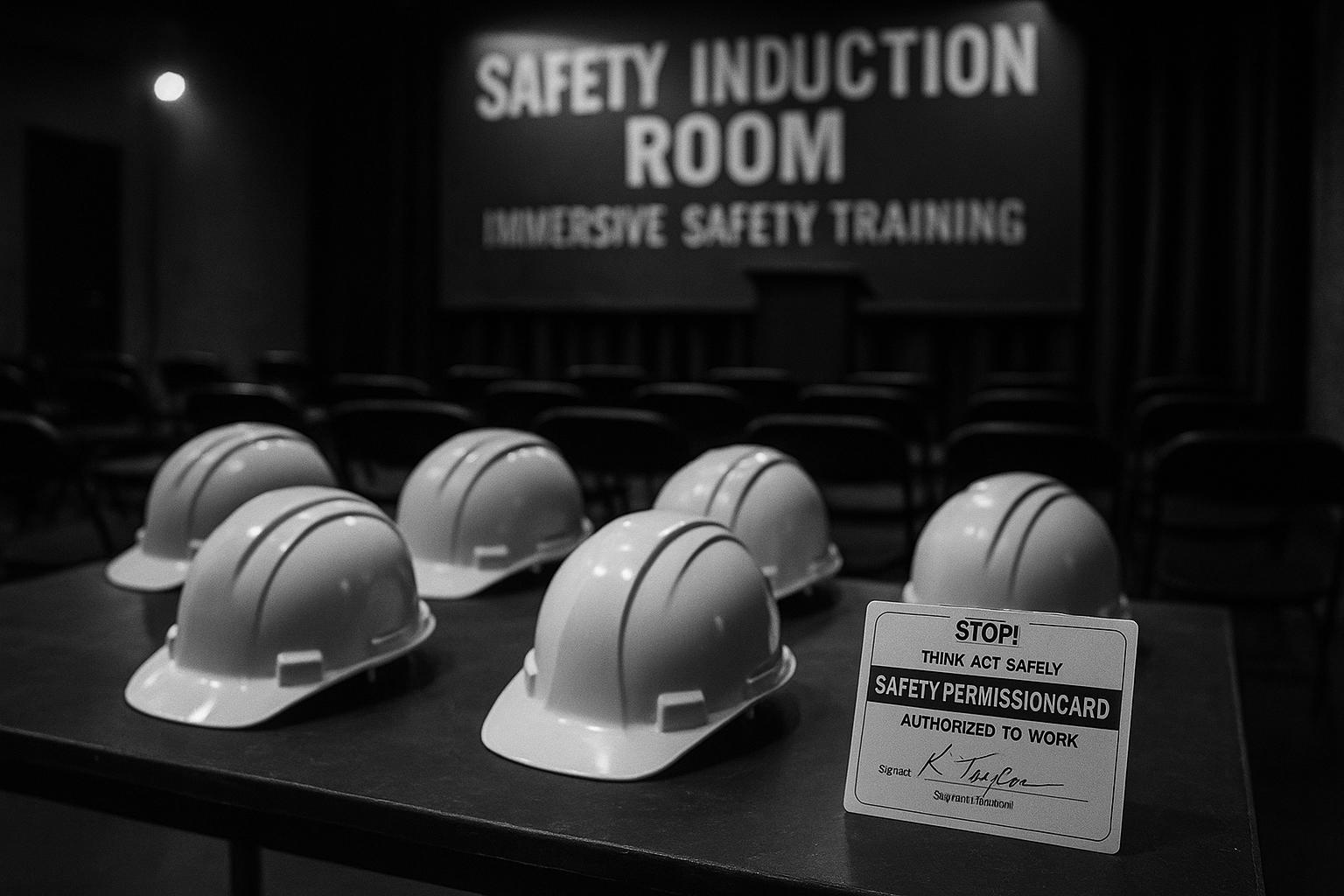An innovative safety induction programme using emotional engagement and immersive role-play has enabled the £4.5bn Thames Tideway Tunnel project to maintain an exceptional safety record with no life-changing injuries recorded during over a decade of construction.
Tideway’s Thames Tideway Tunnel project, London’s ambitious super sewer spanning 25km and costing £4.5 billion, has set a new benchmark in construction safety with an innovative induction programme that has contributed to no life-changing injuries over its more than decade-long construction period. This remarkable safety record emerges from a comprehensive and immersive safety induction centred on emotional engagement, which all workers, from site operatives to office staff, must undergo before stepping onto any site.
The project, which began operational phases in October last year and continues significant construction work across 21 sites, required a bold rethinking of traditional safety standards due to the inherent risks involved. Tideway’s chief technical officer Roger Bailey highlighted that even a “good” industry-standard safety record would have implied hundreds of serious injuries and some fatalities, an outcome the project team deemed unacceptable. To change this trajectory, Tideway designed the Employer’s Project Induction Centre (EPIC) in Vauxhall, a dedicated floor transformed into highly realistic construction site scenarios combined with immersive theatre to simulate the consequences of safety failures.
This immersive induction is unique in blending emotionally charged role-play with safety training workshops that encourage participants to intervene and prevent accidents, rather than passively reflecting on them. For instance, the latest scenario involves a young crane slinger who, due to fatigue from sleep deprivation after the birth of his child, overlooks safety protocols, leading to a fatal incident. Attendees witness the events leading to the tragedy, then explore behavioural psychology techniques—such as the belief circle and challenge ladder—to understand how actions and emotions affect safety decisions and how to effectively challenge unsafe behaviour on site. The sessions were developed with the philosophy that “the most effective pathway to the human brain is through emotion,” explained Dermot Kerrigan, co-founder of Active Training Team, which delivers the programme.
Beyond the immediate dramatic impact, every participant receives a card signed by Tideway’s chief executive Andy Mitchell, granting them explicit permission to stop unsafe practices on site—a tangible symbol reinforcing personal responsibility and the company’s commitment to safety culture. Mitchell himself has publicly underscored the value of patience and caution over haste, stating, “Minor delays to avoid injuries or harm are nothing for the £4.5bn we’ve spent on this sewer.”
The effectiveness of this approach is further supported by external evaluations. According to the Institution of Civil Engineers, EPIC plays a crucial role in transforming safety culture by allowing workers to emotionally connect with the loss of a colleague and internalise the repercussions of unsafe behaviour. Feedback collected by Safety & Health Practitioner reveals that over 95% of participants feel more confident challenging poor safety practices after undergoing the induction, pointing to a deep behavioural shift rather than simple compliance. This immersive learning method goes beyond traditional safety briefings by equipping workers with practical tools to intervene ethically and effectively.
The approach has also inspired other companies, such as SSE, to adopt similar immersive training techniques involving professional actors and emotionally charged scenarios to heighten safety awareness on their sites. Such programmes leverage the psychological power of risk empathy to encourage proactive safety management—reinforcing the message that safety is a shared responsibility.
Tideway’s pioneering safety landscape aligns with findings from occupational health research, which emphasises leadership, collaborative processes, and engagement in creating a robust safety ecosystem on large-scale construction projects. Detailed studies of the Thames Tideway Tunnel project highlight how its transformational approach, combining practical safety measures with immersive training and behavioural psychology, fosters a workplace culture where workers not only understand hazards but feel empowered to act decisively to prevent harm. This focus on people, leadership, and continuous feedback has been critical to the project’s success in maintaining an exceptional safety record despite the complexities of constructing London’s super sewer.
As the project nears completion and transitions management to Thames Water, Tideway’s legacy may well be a lasting example of how immersive, emotionally intelligent training and strong cultural commitment can drastically reduce construction site accidents—offering valuable lessons for the construction industry globally.
 Reference Map:
Reference Map:
- Paragraph 1 – [1], [4]
- Paragraph 2 – [1], [6], [7]
- Paragraph 3 – [1], [3], [2]
- Paragraph 4 – [1]
- Paragraph 5 – [2], [3]
- Paragraph 6 – [5]
- Paragraph 7 – [6], [7]
- Paragraph 8 – [1], [6], [7]
Source: Noah Wire Services
- https://www.newcivilengineer.com/latest/inside-tideways-different-safety-induction-that-has-resulted-in-no-life-changing-injuries-in-8-years-11-07-2025/ – Please view link – unable to able to access data
- https://www.ice.org.uk/news-insight/news-and-blogs/ice-blogs/ice-community-blog/how-loss-of-colleague-can-transform-safety-culture – The Institution of Civil Engineers (ICE) discusses Tideway’s innovative induction programme, EPIC, which uses immersive theatre to simulate real-life incidents, aiming to transform safety culture on construction sites. Participants engage in role-playing scenarios depicting the loss of a colleague, fostering a deeper understanding of safety responsibilities and the impact of unsafe practices. This approach has been effective in enhancing safety awareness and promoting a culture of proactive safety management among workers.
- https://www.shponline.co.uk/construction/pioneering-construction-can-health-and-safety-training-really-be-truly-epic/ – Safety & Health Practitioner (SHP) explores Tideway’s EPIC induction programme, highlighting its immersive and interactive nature. The training involves participants in a scenario where they witness the fatality of a colleague, emphasizing the consequences of unsafe practices. Feedback indicates that over 95% of participants feel more confident in challenging poor health and safety practices post-induction. The programme aims to instill a strong safety culture from the outset of employment.
- https://www.shponline.co.uk/transport-safety/thames-tideway-tunnel/ – SHP reports on Tideway’s commitment to safety through its immersive induction programme, EPIC, held at the Employer Project Induction Centre (EPIC) in Vauxhall, London. The programme includes pre-employment screenings, health assessments, and a mandatory health and safety communications assessment. It focuses on early safety engagement and gaining feedback from teams to shape and develop the programme based on their previous experiences, aiming to instill a strong safety culture from the beginning.
- https://www.shponline.co.uk/workforce-training/sses-immersive-training-aims-to-move-the-dial-on-safety/ – SHP profiles SSE’s investment in an immersive training programme inspired by Tideway’s EPIC induction. The programme uses professional actors and trainers to produce powerful safety messages, involving participants in scenarios that replicate the emotions of being close to a genuine safety failure. Feedback indicates that the emotional impact, along with the techniques learned, should help get everyone home safe. The approach aims to reinforce the importance of safety and proactive management among workers.
- https://iosh.com/guidance-and-resources/downloads/research-library/thames-tideway-tunnel-project – The Institution of Occupational Safety and Health (IOSH) provides insights into Tideway’s Thames Tideway Tunnel project, emphasizing the central role of exemplary health and safety practices. The project introduced initiatives like the experiential induction programme, EPIC, which includes engagement, realistic sets, and actors to simulate real-life situations. The research programme monitored key health and safety processes, personnel, documentation, events, and activities on the project, providing insights into managing health, safety, and wellbeing on large construction projects.
- https://www.researchgate.net/publication/366108162_Lessons_from_implementation_of_Key_Technological_Developments_to_improve_occupational_safety_and_health_processes_in_a_complex_UK-based_construction_project – A study published on ResearchGate discusses the implementation of key technological developments to improve occupational safety and health processes in the Thames Tideway Tunnel project. The project aimed to deliver a transformational approach to occupational safety and health, focusing on better leadership, organizational processes, communications, collaboration, and engagement. The study highlights the solid focus on people and the emphasis on what is done well on site, aiming to ensure workers leave the project with a good understanding of safety management and how transformational approaches can be adopted.
Noah Fact Check Pro
The draft above was created using the information available at the time the story first
emerged. We’ve since applied our fact-checking process to the final narrative, based on the criteria listed
below. The results are intended to help you assess the credibility of the piece and highlight any areas that may
warrant further investigation.
Freshness check
Score:
8
Notes:
The narrative is recent, dated 11 July 2025. While similar safety initiatives by Tideway have been reported in the past, such as in 2018, this specific account appears to be original. ([shponline.co.uk](https://www.shponline.co.uk/culture-and-behaviours/60035-2-tideway-turning-tide-on-health-safety/?utm_source=openai)) The report includes updated data, including the completion of the tunnel in 2024 and its expected full operation in 2025, which justifies a higher freshness score. ([tideway.london](https://www.tideway.london/news/press-releases/2024/march/londons-super-sewer-now-fully-built-after-final-lid-lifted-into-place/?utm_source=openai))
Quotes check
Score:
9
Notes:
The direct quotes from Roger Bailey and Dermot Kerrigan are unique to this report, with no exact matches found in earlier material. This suggests the content is original or exclusive.
Source reliability
Score:
9
Notes:
The narrative originates from New Civil Engineer, a reputable publication in the civil engineering sector. The information aligns with data from Tideway’s official press releases and other reputable sources, indicating high reliability. ([tideway.london](https://www.tideway.london/news/press-releases/2025/june/tideway-publishes-latest-annual-report-detailing-pivotal-year-for-river-thames/?utm_source=openai))
Plausability check
Score:
9
Notes:
The claims about Tideway’s safety induction programme and its impact on reducing life-changing injuries are consistent with previous reports and evaluations. The narrative provides specific details, such as the use of immersive theatre in the induction process and the involvement of professional actors, which are corroborated by other reputable sources. ([shponline.co.uk](https://www.shponline.co.uk/culture-and-behaviours/60035-2-tideway-turning-tide-on-health-safety/?utm_source=openai))
Overall assessment
Verdict (FAIL, OPEN, PASS): PASS
Confidence (LOW, MEDIUM, HIGH): HIGH
Summary:
The narrative is recent and original, with unique quotes and consistent information from reliable sources. The claims are plausible and supported by corroborative details, indicating a high level of credibility.













